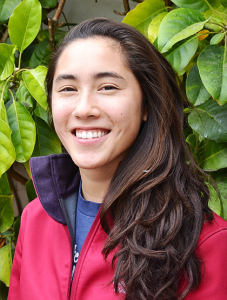Paloma Medina ’14 has always held an interest in science, but during her first year as a Scripps student she wasn’t sure she would pursue it as a career. Something clicked during her organic chemistry class, however, and now four years later she’s graduating with a degree in biology and preparing for a yearlong research opportunity supported by a Fulbright fellowship to work with the Max Planck Institute for Developmental Biology in Tubingen, Germany.
“Being surrounded by women in my Scripps classes motivated me to be a woman in science,” the South Pasadena native says. “I felt a lot of support on campus.”
Medina worked closely with W.M. Keck Science Department faculty to build a strong foundation in science, including professors Gretchen Edwald-Gilbert, Mary Hatcher-Skeers, and Julia Massimelli. “I don’t think these women know how much they inspire me,” she says. “I am much more confident in my abilities as a scientist, thinker, and write as a result.”
The confidence led to research in Costa Rica in 2012 and an initial stint in Tubingen in the summer of 2013. Medina considers them both “eye-opening experiences” because of their glimpse into the worlds of research, travel, and communication.
Medina’s Fulbright fellowship allows her to work with the Planck Institute creating a recombination system that she’ll use to characterize the function of HOX genes – genes critical for morphological development. “The project will be challenging and require a lot of commitment,” she says,” but I anticipate the experience as a whole will be awesome.”
When asked about her post-Fulbright path, Medina believes she will either pursue a graduate degree or possibly medical school. Regardless of the choice, she believes both her Scripps background and her Fulbright fellowship will provide a critical foundation for building her future as a woman of science.


